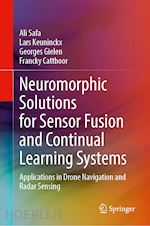
Questo prodotto usufruisce delle SPEDIZIONI GRATIS
selezionando l'opzione Corriere Veloce in fase di ordine.
Pagabile anche con Carta della cultura giovani e del merito, 18App Bonus Cultura e Carta del Docente
This book provides novel theoretical foundations and experimental demonstrations of Spiking Neural Networks (SNNs) in tasks such as radar gesture recognition for IoT devices and autonomous drone navigation using a fusion of retina-inspired event-based camera and radar sensing. The authors describe important new findings about the Spike-Timing-Dependent Plasticity (STDP) learning rule, which is widely believed to be one of the key learning mechanisms taking place in the brain. Readers will be enabled to create novel classes of edge AI and robotics applications, using highly energy- and area-efficient SNNs
Introduction.- Bridging the accuracy gap between SNNs and DNNs via the use of pre-processing for radar applications.- Design of a drone platform for sensor fusion data acquisition.- A top-down approach to SNN-STDP networks.- Sensor-fusion SLAM with continual STDP learning.- Continually learning people detection from DVS data.- Active inference in Hebbian learning networks.- Conclusions and future work.- Appendix.
Ali Safa (Member, IEEE) received the M.Sc. degree (highest honors) in electrical engineering from the ULB-VUB, Brussels, Belgium. He joined imec and Katholieke Universiteit Leuven (KU Leuven) in 2020, where he is currently pursuing a Ph.D. degree in AI-driven processing for extreme edge applications. He has been a visiting researcher at UC San Diego, La Jolla, USA during Spring 2023. He has authored or co-authored more than 30 papers in international journals and conference proceedings. His research interests include neuromorphic AI, continual learning, and sensor fusion for robot perception.
Lars Keuninckx received the M.Eng. degree in telecommunications from Hogeschool Gent, Ghent, Belgium, in 1996, and a B.Sc. in physics and the Ph.D. degree in engineering from Vrije Universiteit Brussel, Brussels, Belgium, in 2009 and 2016, respectively. After his engineering studies, he worked in the industry for several years, designing electronics for automotive, industrial, and medical applications. He joined IMEC, Leuven, in 2019, wherehe is currently Principal Member of Technical Staff in the design of neuromorphic systems. His research interests include the applications of complex dynamics and reservoir computing.
Georges G.E Gielen (Fellow, IEEE) received the MSc and PhD degrees in Electrical Engineering from the Katholieke Universiteit Leuven (KU Leuven), Belgium, in 1986 and 1990, respectively. He currently is Full Professor in the MICAS research division at the Department of Electrical Engineering (ESAT) at KU Leuven. Since 2020 he is Chair of the Department of Electrical Engineering. His research interests are in the design of analog and mixed-signal integrated circuits, and especially in analog and mixed-signal CAD tools and design automation. He is a frequently invited speaker/lecturer and coordinator/partner of several (industrial) research projects in this area, including several European projects. He has (co-)authored 10 books and more than 600 papers in edited books, international journals and conference proceedings. He is a 1997 Laureate of the Belgian Royal Academy of Sciences, Literature and Arts in the discipline of Engineering. He is Fellow of the IEEE since 2002, and received the IEEE CAS Mac Van Valkenburg award in 2015 and the IEEE CAS Charles Desoer award in 2020. He is an elected member of the Academia Europaea.
Francky Catthoor (Fellow, IEEE) received a Ph.D. in electrical engineering from KU Leuven, Belgium in 1987. Between 1987 and 2000, he has headed several research domains in the area of synthesis techniques and architectural methodologies. Since 2000 he is strongly involved in other activities at IMEC including co-exploration of application, computer architecture and deep submicron technology aspects, biomedical systems and IoT sensor nodes, and photo-voltaic modules combined with renewable energy systems, all at IMEC Leuven, Belgium. Currently, he is an IMEC senior fellow. He is also part-time full professor at the Electrical Engineering department of the KU Leuven (ESAT).











Il sito utilizza cookie ed altri strumenti di tracciamento che raccolgono informazioni dal dispositivo dell’utente. Oltre ai cookie tecnici ed analitici aggregati, strettamente necessari per il funzionamento di questo sito web, previo consenso dell’utente possono essere installati cookie di profilazione e marketing e cookie dei social media. Cliccando su “Accetto tutti i cookie” saranno attivate tutte le categorie di cookie. Per accettare solo deterninate categorie di cookie, cliccare invece su “Impostazioni cookie”. Chiudendo il banner o continuando a navigare saranno installati solo cookie tecnici. Per maggiori dettagli, consultare la Cookie Policy.